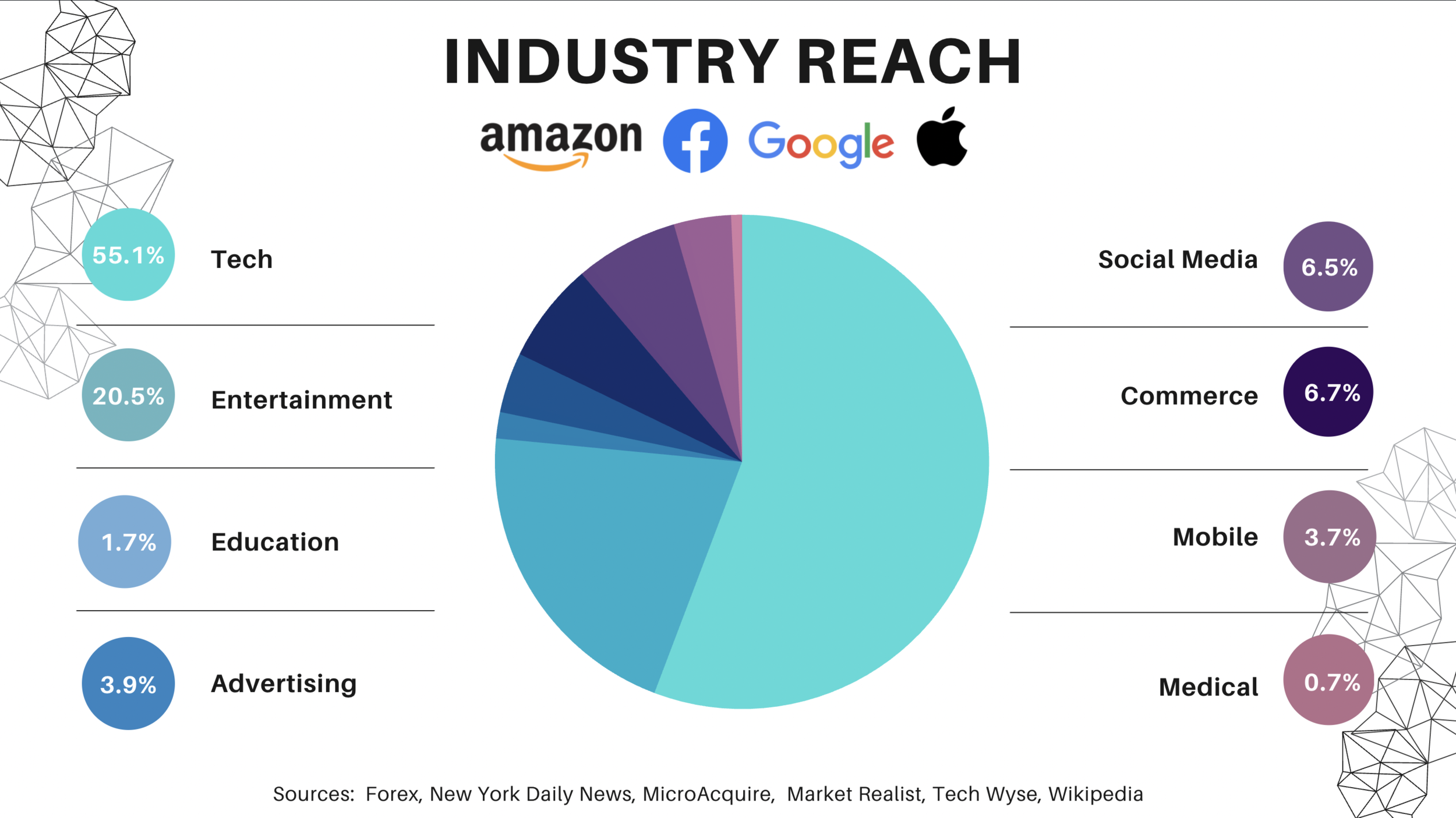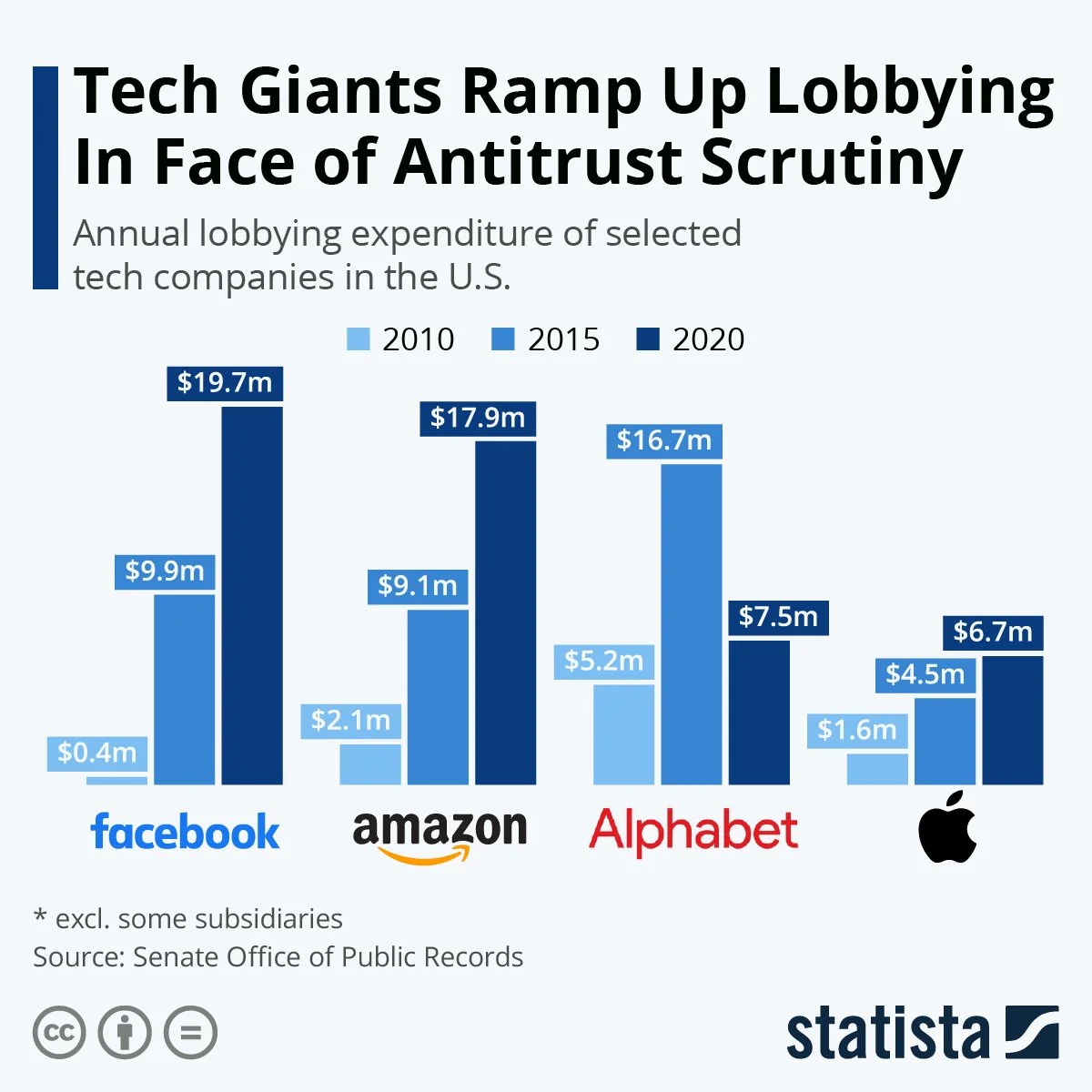Distinguishing Connections
AMT Lab investigates the intersection of arts and technology and how new innovations and uses of tech enhance or transform the artistic experience. However, upon broaching the subject of Big Tech, the consideration of arts organizations is often forgotten, and the focus is solely placed on Silicon Valley and the lucrative world within. But with the increased attention into the world of Big Tech (specifically Apple, Amazon, Alphabet [Google], and Meta [Facebook]) as a result of continual antitrust lawsuits, privacy violations, and the global struggle in creating effective policies to limit these companies’ powers, it is becoming more evident that the activities of Big Tech span across a variety of industries, the arts and nonprofit sector included. This article will provide an overview of the Big Tech monopoly over data and privacy through its cross-market domination. The analysis includes an explanation to why it is imperative that arts organizations obtain an understanding of current events, as it directly affects patron data collected through advertising (on and off social media), in-house software and databases, as well as (most likely) the majority of tech-related solutions owned or used by nonprofit organizations.
Overview: The Battle Against Big Tech
Public policies and lawsuits across the globe are increasing with an attempt to control the power of Big Tech. These efforts have been often made in the form of antitrust legal battles, which have either proven to take extended periods of time or resulted in little success. The European Union has been stricter in regulating Big Tech compared to the United States, but has still struggled in effectively limiting the power of these companies, as their actions often address previous technologies and not those ever-emerging changes. The EU has taken on Alphabet, the parent company of Google, calling it one of the worst monopolistic offenders, crushing any start-up that poses a threat to business. While the company has been fined $9 billion over the past 8 years, considering the length of time it took to achieve these small policy wins, the true consequences are minimal ($9 billion over 8 years is a small sum for Google, who had a revenue of $181.69 billion in 2020). While lawsuits over the past decade have achieved little in limiting the growth of power of large tech corporations, the efforts have pathed the way for more effective strategies in approaching these legal battles.
Many antitrust lawsuits against these companies focus on market domination. However, the key reason behind this public policy push is data and its market value. The robust ownership of services across diverse industries gives these corporations direct control and access to a wealth of data. Whether collected through the social media or search engine advertising in which an organization partakes, or the emerging headsets and glasses used for new, immersive AR or VR, these companies can gathered extensive amounts of personal and sensitive information from the majority of the general public. They can use this data however they wish, primarily for selling advertising. Figure 1 below gives a visualization of the general industries in which Meta, Apple, Amazon, and Alphabet directly do business.
Figure 1: Overall industry reach of Amazon, Alphabet, Apple, and Meta as a whole. Photo by author. Sources: Forex (1, 2, 3), New York Daily News, MicroAcquire (1, 2), Market Realist, Tech Wyse, Wikipedia (1, 2).
Margrethe Vester, the European Competition Commissioner, is the world leader in combating Big Tech. She stresses the importance of understanding data laws: how data is an asset and how it influences the market. But these key points of understanding are hard to isolate and define, since the internet was originally created as a space without bounds and regulations. This contributes to the lack of global coordination in strategizing tactics to combat these Tech Giants. Companies such as Alphabet, Meta, Apple, and Amazon – all based in the United States – are the largest offenders of this global monopoly.
The United States has made public policy efforts to limit the power of Big Tech, such as the proposed Ending Platform Monopolies Act, the Justice Department suing Google for the violation of antitrust laws, and recent appointments of harsh tech critics in key administrative roles implemented by President Biden. While the U.S. government efforts have contributed to the global strides in combating Big Tech, it lacks the vigor that the EU has, which might be due to the fact that the industry’s big players – Meta, Amazon, Apple, and Alphabet – are the country’ leading spenders in federal lobbying, as shown in Figure 2 below. It is important to note that Alphabet cut their lobbying spending by almost half in 2019 through firing about a half dozen of its largest lobbying firms in order to mitigate suspicion from antitrust probes. While this raises questions regarding the earnest quality of tech limitation efforts in the government space, Democrats in Congress have been increasingly more adamant about regulating Big Tech, especially after the January 6th insurrection. Due to the vast effect regulation would have, these efforts should be closely followed and supported by all industries, including the arts.
Figure 2: Big Tech lobbying spending from 2010-2020. Source: Statista.
The Nonprofit Arts & Big Tech
At a glance, the battle against Big Tech seems distant from the world of performing and visual arts. It involves heavy verbiage of policy and law, often with news and journal headlines underscoring issues of data, privacy, and monopolistic tendencies. However, when further investigated, the reach of Google, Amazon, Apple, and Facebook extends much farther than assumed (see Figure 3 below). These four companies, along with a few others, have almost total control over e-commerce, online advertising, and search engines through the range of their subsidiaries and acquisitions. This expansive reach allows these corporations to have access and control over a wealth of data. The data is often used for the promotion of their own services and a desire to limit competition. This is important for arts organizations, as they partake in online advertising through social media and on search engines, sell merchandise and tickets through internet servers, among other activities, all of which is data that is not only collected by these organizations, but by the companies whose services are being leveraged. It would be unsurprising if any given arts organization only uses products from one of these four companies – even without knowing – as the amount of new organizations, mergers, and acquisitions is almost too large to track. Facebook owns an estimated total of 91 companies, Apple owns an estimated 114 companies, Amazon owns an estimated 128 companies, and Google has the largest collection, owning an estimated 232 companies. The following infographic (Figure 3) presents an overview of as well as the overarching industries in which Alphabet, Amazon, Apple, and Meta perform direct business.
Figure 3: Overall industry reach of Amazon, Alphabet, Apple, and Meta individually and as a whole. Photo by author. Sources: Forex (1, 2, 3), New York Daily News, MicroAcquire (1, 2), Market Realist, Tech Wyse, Wikipedia (1, 2).
Of all the businesses that Amazon, Apple, Facebook, and Google own, 20% are categorized as entertainment companies. While these organizations are not directly related to the fine visual and performing arts industries, it is a clear indicator that Big Tech is everywhere. Additionally, according to The State of Data in the Nonprofit Sector, 90% of nonprofits collect data and 40% use this data to make informed decisions. Of the respondents of the study, 97% indicated a desire to learn more about data and its uses. These four companies specialize in data, specifically software, AI and machine learning, as well as BI and Cloud Computing. Due to their expansion over software, tools that streamline data collection, and document storage, nonprofits likely already share a great deal of their business with the world of Big Tech.
An Integrated World
The arts industry and nonprofits are intermingled with the world of Big Tech due to the industry reach that Amazon, Apple, Meta, Alphabet, and other similar companies have in the domestic and global market. Thus, as the war against the tech world rages on, it is important that arts enterprises stay current with news relating to the industry. While lawsuits, policies, and regulations unfold, it will not only shift the way that people and governments interact with technology, but it will vastly change the way that arts and nonprofit organizations are run.
+ Resources
A V, Ramzeen. “Facebook Acquisitions – The Complete List (2021).” TechWyse. TechWyse Internet Marketing, August 12, 2021. https://www.techwyse.com/blog/infographics/facebook-acquisitions-the-complete-list-infographic/.
Alba, Alejandro. “A List – From A to Z – of All of the Companies, Brands Google’s Alphabet Currently Owns.” Daily News. New York Daily News, August 11, 2015. https://www.nydailynews.com/news/world/z-list-brands-companies-google-alphabet-owns-article-1.2321981.
“Big Tech and Democracy: The Critical Role of Congress.” Belfer Center for Science and International affairs and Shorenstein Center for Media, Politics and Public Policy, April 2019. https://www.belfercenter.org/publication/big-tech-and-democracy-critical-role-congress.
Cattlin, Rebecca. “Google’s Biggest Acquisitions: What does Google Own?” Forex.com. FOREX.com, August 26, 2021. https://www.forex.com/en/market-analysis/latest-research/google-acquisition-history/.
Cattlin, Rebecca. “Amazon Acquisitions: What Does Amazon Own?” Forex.com. FOREX.com, August 16, 2021. https://www.forex.com/en/market-analysis/latest-research/what-does-amazon-own/.
Cattlin, Rebecca. “Apple’s Biggest Acquisitions: What Does Apple Own?” Forex.com. FOREX.com, August 3, 2021. https://www.forex.com/en/market-analysis/latest-research/apple-acquisition-history/.
Dans, Enrique. “Around the World, Governments Are Readying to Regulate Big Tech.” Forbes. Forbes Media, LLC, May 2, 2021. https://www.forbes.com/sites/enriquedans/2021/05/02/around-the-world-governments-are-readying-to-regulate-bigtech/?sh=6ae425695935.
Feiner, Lauren. “Google Reportedly Fires Some of Its Largest Lobbying Firms as it Faces Antitrust Scrutiny.” CNBC. CNBC, LLC. June 12, 2019, https://www.cnbc.com/2019/06/12/google-fires-some-of-its-largest-lobbying-firms---report.html.
Feiner, Lauren. “Google Cut Its Lobbying Spending Nearly in Half in 2019, While Facebook Took the Lead.” CNBC. CNBC, LLC. January 22, 2020, https://www.cnbc.com/2020/01/22/how-much-google-facebook-amazon-and-apple-spent-on-lobbying-in-2019.html.
French, Sally. “All the Companies in Jeff Bezos’s Empire, in One (Large) Chart.” MarketWatch. MarketWatch, Inc., January 30, 2018. https://www.marketwatch.com/story/its-not-just-amazon-and-whole-foods-heres-jeff-bezos-enormous-empire-in-one-chart-2017-06-21.
“Implications of E-commerce for Competition Policy - Note by the United States.” Organisation for Economic Co-operation and Development, DAF/COMP/WD(2018)48 , May 23, 2018, https://www.justice.gov/atr/page/file/1312786/download.
Johnson, Joseph. “Annual Revenue of Google from 2002 to 2020.” Statistia. February 8, 2021, https://www.statista.com/statistics/266206/googles-annual-global-revenue/.
“Justice Department Sues Monopolist Google For Violating Antitrust Laws.” The United States Department of Justice, October 20, 2020. Office of Public Affairs. https://www.justice.gov/opa/pr/justice-department-sues-monopolist-google-violating-antitrust-laws.
Letenyei, Danielle. “Facebook Owns 91 Companies, Including Instagram and Whatsapp.” Market Realist. Market Realist, September 20, 2021. https://marketrealist.com/p/what-companies-does-facebook-own/.
“List of Mergers and Acquisitions by Alphabet.” Wikipedia. Wikimedia, September 20, 2021. https://en.wikipedia.org/wiki/List_of_mergers_and_acquisitions_by_Alphabet.
“List of Mergers and Acquisitions by Amazon.” Wikipedia. Wikimedia, October 11, 2021. https://en.wikipedia.org/wiki/List_of_mergers_and_acquisitions_by_Amazon.
Lyall, Sarah. “Who Strikes Fear Into Silicon Valley? Margrethe Vestager, Europe's Antitrust Enforcer.” The New York Times, May 5, 2018. https://www.nytimes.com/2018/05/05/world/europe/margrethe-vestager-silicon-valley-data-privacy.html.
Mozur, Paul, Cecilia Kang, Adam Satariano, and David Mccabe. “A Global Tipping Point for Reining in Tech Has Arrived.” The New York Times, April 20, 2021. https://www.nytimes.com/2021/04/20/technology/global-tipping-point-tech.html.
Nicholas, Gabriel. “Be Wary When Big Tech Says It's Defending Your Privacy - The Boston Globe.” The Boston Globe. Boston Globe Media Partners, LLC, April 12, 2021. https://www.bostonglobe.com/2021/04/11/opinion/be-wary-when-big-tech-says-its-defending-your-privacy.
Oremus, Will. “Analysis: The Battle to Break Up Big Tech Has Just Begun.” The Washington Post, June 30, 2021. https://www.washingtonpost.com/technology/2021/06/29/big-tech-breakup-battle/.
Ritcher, Felix. “Epic Games vs. Apple: Legal Battle Royale.” Statista, August 14, 2020. https://www.statista.com/chart/16239/number-of-registered-fortnite-players/.
Ovide, Shira. "Google and Facebook's Ad Empires." The New York Times. The New York Times Company. October 28, 2021, https://www.nytimes.com/2021/10/28/technology/google-facebook-advertising.html?searchResultPosition=3.
Richter, Felix. “Facebook's Acquisitions: How It Started, How It's Going.” Statista, December 10, 2020. https://www.statista.com/chart/23742/monthly-active-users-of-instagram-and-whatsapp/.
Richter, Felix. “Tech Giants Ramp Up Lobbying In Face of Antitrust Scrutiny.” Statista, January 25, 2021. https://www.statista.com/chart/18792/annual-lobbying-expenditures-of-major-tech-companies-in-the-us/.
Ryan, Tracy, Chad Day, and Anthony DeBarros. "Facebook and Amazon Boosted Lobbying Spending in 2020; the Tech Giants Led all Other Companies in Federal Lobbying Expenditure Last Year, Reports show."
Wall Street Journal (Online), Jan 24, 2021. https://www-proquest-com.cmu.idm.oclc.org/newspapers/facebook-amazon-boosted-lobbying-spending-2020/docview/2480079233/se-2?accountid=9902.
Satariano, Adam. “Europe Is Toughest On Big Tech, Yet Big Tech Still Reigns.” The New York Times, November 11, 2019. https://www.nytimes.com/2019/11/11/business/europe-technology-antitrust-regulation.html.
Smith, Brad and Carol Ann Browne. Tools and Weapons: The Promise and the Peril of the Digital Age. New York: Penguin Books, 2019. https://search-ebscohost-com.cmu.idm.oclc.org/login.aspx?direct=true&db=nlebk&AN=2037578&site=ehost-live&scope=site.
“The Antitrust Laws.” Federal Trade Commission, December 15, 2017. https://www.ftc.gov/tips-advice/competition-guidance/guide-antitrust-laws/antitrust-laws.
“The State of Data in the Nonprofit Sector.” Hubspot. Everyaction and Nonprofit Hub, https://cdn2.hubspot.net/hubfs/433841/The_State_of_Data_in_The_Nonprofit_Sector.pdf.
Vincent, James. “Facebook is Researching AI Systems that See, Hear, and Remember Everything You Do.” The Verge. Vox Media, LLC. October 14, 2021, https://www.theverge.com/2021/10/14/22725894/facebook-augmented-reality-ar-glasses-ai-systems-ego4d-research.
“What Companies Does Apple Own?” Microacquire. AcquiredBy, 2021. https://acquiredby.co/what-companies-does-apple-own/.
“What Companies Does Facebook Own?” Microacquire. AcquiredBy, 2021. https://acquiredby.co/what-companies-does-facebook-own/.



